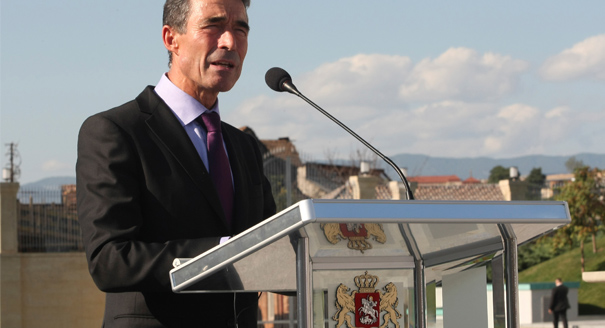There is life in an old dog yet. Many thought that NATO enlargement was a topic of the past. In an Alliance grown by twelve countries since the end of the Cold War, there was only a limited appetite for further accession rounds. A few allies were pushing, but a large and important group did not want to raise the membership question again so soon. Instead, pressing issues like Afghanistan or partnership with countries beyond the Euro-Atlantic area dominated the agenda. Of course, NATO’s door will remain open and there are four countries still officially recognized as aspirants: Bosnia-Herzegovina, the Former Yugoslav Republic of Macedonia, Montenegro, and Georgia. However, no timetable for admission was given and enlargement seemed to remain on the backburner.
This held true until late spring 2012. At NATO’s Chicago Summit in May, U.S. Secretary of State Hillary Clinton requested—largely unnoticed by the public —that Chicago should be the last summit that is not on enlargement. A month later, the first informal discussions among NATO representatives in Brussels showed a vast majority in favor of rapid enlargement steps. As to be expected, the apple of discord was not one of the first three candidates mentioned above, but of Georgia, a country which fought a war with Russia in 2008 and still has Russian occupation forces in its territory. A large fraction of NATO members led by Washington opt for a rapid admission of Georgia, reminding of the contributions the country made in Afghanistan and pointing to the Georgian need for NATO’s support given its tensions with Russia. A minority in NATO led by Germany puts exactly the same argument in the center of its criticism: The smoldering crisis between Russia and Georgia could escalate to another war in which NATO, according to Article 5 of the Washington Treaty, could find itself in a war with Russia. How credible would the Article 5 commitment be under such circumstances? According to this reasoning, Georgian membership in NATO would not contribute to the security of the North Atlantic area, as Article 10 of the NATO Treaty stipulates. It could, however, import instability to the Alliance.
Given that NATO’s cohesion is already strained by the growing mismatch between rising ambitions and shrinking budgets, and in light of a deteriorating NATO-Russia partnership, a fierce debate on new members could further burden the transatlantic ties. The possibility of a new U.S. president next year, who regards Moscow more as a problem than a partner, will not help. On the other hand, those who say that Russia should not have a veto on NATO’s membership decisions have a point. Actually, Moscow’s threats against NATO which are brought forward on an almost regular basis arguably ring hollow—Russia’s weight on the international scene has decreased significantly.
How to proceed to bolster NATO’s open door policy, but at the same time not to stir up the already precarious relationship with Russia? Two steps could be useful. First, NATO should recall its Enlargement Study published in 1995 which states that enlargement should not only be a benefit for the admitted countries but also add to the efficiency of NATO itself. It also states that territorial disputes need to be settled peacefully before membership can be granted. Second, NATO could use its next summit to admit Georgia to the so-called Membership Action Plan, a special NATO program for aspirants which all candidates had passed before joining the Alliance. This would be a visible step forward for Georgia and would provide NATO with breathing space for consensus building.
Karl-Heinz Kamp is the research director of the NATO Defense College in Rome. The author expresses his personal views.






